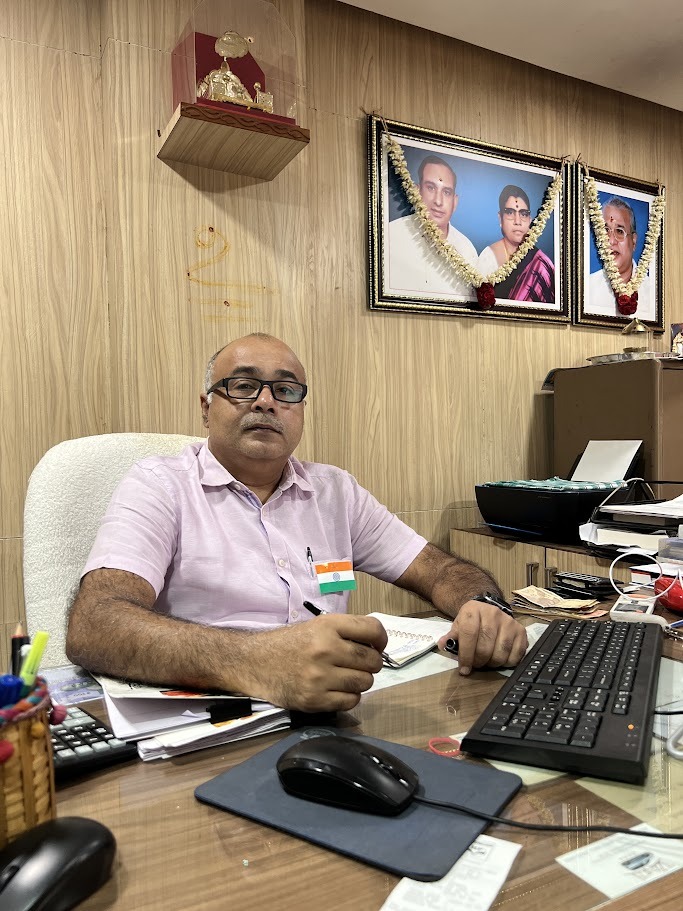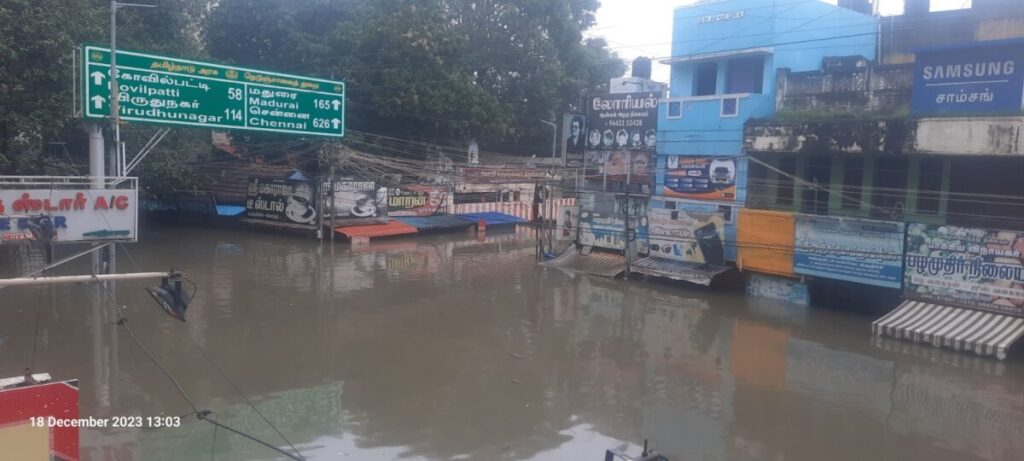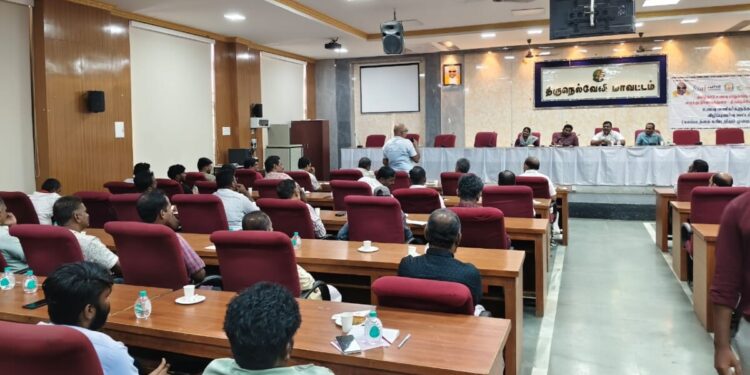U. Bharath (cbedit@imaws.org)
The Thamirabarani river, which runs across Tirunelveli, is the lifeline of the entire region. Yet, for hundreds of business owners, especially restaurateurs, the same river has turned into a recurring nightmare during the monsoon months. In 2023 and again in 2024, heavy flooding during the North-East Monsoon inundated the city’s junction area — the busiest business district — leaving restaurants, bakeries and retail outlets underwater for days. The repeated flooding has caused losses worth crores of rupees, destroyed costly kitchen equipment and left businesses struggling to recover.
Losses Running into Crores
The scale of the damage has been devastating. “The total losses due to the flooding in Tirunelveli city could be put at a few crores, and many of the restaurants in the affected area lost electronics and kitchen equipment worth Rs 70–80 lakh each,” said R. Ramkumar, President of the Tirunelveli Hotels’ and Restaurants’ Association (THRA).
Quite recently, December 2023 brought one of the worst floods to the region. In parts of the junction area of the city, water levels rose to nearly 20 feet and remained stagnant for several days, crippling movement and operations. Barely a year later, in November 2024, another spell of flooding left behind equally grim scenes of devastation.

“The waterlogging damaged generators, electronic items and kitchen equipment, including coffee grinding machines, coconut scrubbers and dishwashing machines. Most restaurants in these areas lost all their assets and were out of business for almost a month,” Ramkumar explained in an exclusive chat with Kitchen Herald. For many establishments, the temporary closure meant not only direct property loss, but also weeks of lost revenue.
Insurance Gaps Deepen the Crisis
The financial impact of the floods was compounded by the lack of adequate insurance cover among most restaurateurs. “Due to poor insurance coverage among restaurateurs, only 10% of them have been compensated for their losses due to floods,” Ramkumar lamented.
The reason, according to him, is the prohibitive premium cost. “For example, for Rs 1 crore coverage, one has to pay Rs 1 lakh as annual premium. This is not within the reach of small players in the sector. Therefore, even though over 100 restaurants were affected by flooding, only a few got compensated,” he added.
This left a vast majority of affected businesses with no financial cushion. The collapse of a generator alone could cause losses of up to Rs 40 lakh, Ramkumar pointed out, underlining how vulnerable uninsured businesses were during the floods.
Streets Turn into Rivers
The floods of 2023 and 2024 were not mere numbers or statistics on paper; in fact, they changed the face of the city’s busiest stretches. The junction area bore the brunt of flooding, with arterial roads, such as Madurai Road, Station Road, Kanniamman Kovil Street and Raja Building Road, submerged.

Residents and workers waded through waist-deep water, while several hotels and restaurants were entirely cut off. The scale of inundation was so severe that, for many establishments, operations were halted for weeks, if not months.
“Some restaurants in the junction area, including Bharani Hotel, Janakiram Hotel and Blue Star Hotel, were 20 feet deep in water, due to which huge losses were incurred and businesses affected for over a month during the 2023 floods,” Ramkumar recollected.
Encroachments and Poor Drainage
Industry representatives point to the crumbling storm water drainage system and rampant encroachments as rootcauses of this recurring problem. Tirunelveli was once known for its vast network of drains and canals, which efficiently carried rainwater away. Today, many of those channels are clogged, encroached upon or neglected. “The junction odai (canal), which was once 30 feet in depth and 5 feet wide, has lost much of its utility. It is in a pathetic state due to lack of renovation by the Tirunelveli Municipal Corporation. Most of the channels in the city are in poor condition, and many of them have almost disappeared,” Ramkumar observed.
Manikandan, Secretary of THRA, echoed the concern, adding that indiscriminate littering has made matters worse. “Plastic wastes, including water bottles and thermocol, choke the drains, and this leads to slow draining of flood waters. Wastes generated by bulk generators like restaurants, marriage halls and even medical facilities should be properly collected and disposed of by the civic body,” he suggested.
According to him, a mix of encroachment, littering and poor maintenance has cooked up a perfect storm. “Combined with unbridled littering of plastic waste by callous citizens all over the place, the flood situation during every monsoon has become a nightmare for the business sector,” he remarked.
Health Hazards and Human Toll
The floods have also led to a public health crisis. “At least 5 to 6 persons have died in the floods, and many of the flood-affected, including hotel employees, suffered from infectious diseases, including water-borne diseases, in its aftermath,” Ramkumar said.
For hospitality business owners, this was another level of challenge. Apart from repairing and replacing damaged assets, they had to ensure the safety of staff, many of whom fell sick in the days following the floods. Clean-up efforts also required time and money, delaying reopening even further.
Restaurateurs Call for Permanent Solutions
The THRA has consistently urged the state government to step in with permanent solutions. Restaurateurs and hotel owners have demanded annual maintenance of existing storm water drains, construction of new drainage networks in flood-prone areas as well as building of retention walls to block floodwater inflow.
“Even though the underground drainage system was implemented in the city in the 1970s, the drainage system has to be revamped to prevent flooding in the city, whose population has grown manifold over the decades,” said Nayan Singh, Treasurer of THRA.

Despite repeated petitions and representations to the District Collector and the Corporation Commissioner, hoteliers allege that not much has been done beyond minor patchworks. “As of now, there is no remedy in sight for this perennial problem. The flooding issues largely remain unaddressed by the authorities, except for minor works carried out here and there,” Nayan noted.
Anxious Wait as Monsoon Approaches
For many restaurant owners, the onset of the North-East Monsoon brings more fear than relief. Having suffered heavy losses twice in as many years, they now live in constant dread of yet another flood.
Saravanan, owner of Bharani Hotel, one of the worst-affected restaurants during the 2023 flooding, voiced the industry’s collective anxiety. “We look up to the Tamil Nadu government to come out with a permanent solution to save the business community, including restaurateurs and the general public, from recurrent flooding of the junction areas in the city. We are keeping our fingers crossed now as the North-East monsoon has approached, leaving us with a jittery and cold feeling.”
Until strong measures are put in place, Tirunelveli’s restaurateurs remain vulnerable to the forces of nature, bracing themselves each year for another season of uncertainty and potential devastation.






